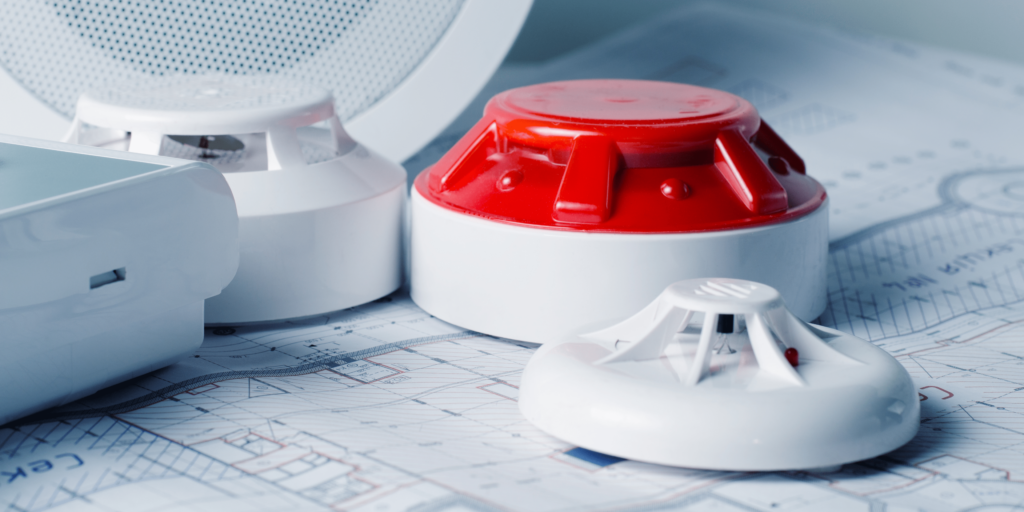When it comes to fire safety in your home or business, understanding the difference between a smoke detector and a fire alarm can be crucial. Both devices are designed to protect lives and property, but they serve distinct roles and have different features. In this comprehensive guide, we’ll explore the key differences between smoke detectors and fire alarms, helping you make informed decisions about your fire safety needs.
What is a Smoke Detector?
A smoke detector is a device that senses smoke in the air and triggers an alarm to alert occupants of a potential fire. Smoke detectors are commonly found in residential settings and are an essential part of home fire safety systems. They come in various types, including:
- Ionization Smoke Detectors: These detectors use a small amount of radioactive material to ionize the air inside the sensing chamber. When smoke particles enter the chamber, they disrupt the ionization process, triggering the alarm.
- Photoelectric Smoke Detectors: These use a light sensor to detect smoke. Smoke particles scatter the light beam, causing the detector to trigger an alarm.
- Dual-Sensor Smoke Detectors: Combining both ionization and photoelectric technologies, these detectors offer enhanced protection by detecting both fast-flaming and slow-smoldering fires.
What is a Fire Alarm?
A fire alarm is a more comprehensive system designed to provide early warning and facilitate a coordinated response in the event of a fire. Fire alarms are commonly used in commercial and larger residential buildings. They consist of several components, including:
- Control Panel: The central hub of the fire alarm system, responsible for monitoring inputs from detectors and initiating alarms when necessary.
- Smoke Detectors and Heat Detectors: These devices detect the presence of smoke or heat and send signals to the control panel.
- Manual Pull Stations: These allow individuals to manually trigger the fire alarm system in case of an emergency.
- Alarm Notification Devices: These include horns, bells, and strobe lights that alert occupants to evacuate.
- Alarm Panels: Provide visual and audible alerts and help with the identification of fire locations within the building.
Key Differences Between Smoke Detectors and Fire Alarms
Smoke Detectors | Fire Alarms | |
| Scope of Protection | Primarily focused on detecting smoke within a specific area, such as a room or corridor. They are suitable for residential and small commercial applications where a comprehensive fire alarm system may not be necessary. | Provide a broader level of protection and are designed for larger buildings or areas requiring a more sophisticated fire safety system. They integrate various components to offer a coordinated response and alert occupants in multiple areas. |
| Complexity and Integration | Simple devices that operate independently or as part of a small network. They are often powered by batteries or low-voltage systems. | Complex systems with multiple interconnected components. They require professional installation and maintenance to ensure proper functioning. Fire alarms are usually connected to building management systems and may include features like remote monitoring. |
| Response Mechanisms | Trigger local alarms to alert people in the immediate vicinity. They are effective for early warning but do not provide coordinated responses or integrate with other systems. | Initiate a coordinated response, including activating alarm notification devices, alerting emergency services, and possibly controlling building systems such as elevators and ventilation. They are designed to manage and respond to fire emergencies in a systematic way. |
Installation and Maintenance | Generally easy to install and maintain. They are often installed in individual rooms or hallways and require regular testing and battery replacement | Installation is more complex and typically requires a professional. Maintenance involves regular inspections, testing, and compliance with local fire safety regulations. |
Why Choosing the Right System Matters
Selecting the appropriate fire safety system for your property depends on several factors, including the size of the building, the number of occupants, and the specific fire hazards present. For residential settings, smoke detectors are usually sufficient. However, for larger commercial buildings or multi-story residences, a comprehensive fire alarm system offers enhanced protection and a more coordinated response.
Conclusion
Understanding the difference between smoke detectors and fire alarms is essential for ensuring effective fire safety measures. Smoke detectors provide crucial early warnings of smoke, while fire alarms offer a comprehensive system for managing and responding to fire emergencies. By choosing the right system for your needs, you can better protect your property and the lives of those within it.
At Pace Safety, we specialize in providing high-quality fire safety solutions tailored to your specific requirements. Whether you need smoke detectors for your home or a sophisticated fire alarm system for your business, our expert team is here to help. Explore our range of fire safety products and services to ensure your property is equipped with the best protection available.
For more information on our fire safety solutions, visit our website Pace Safety

